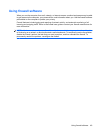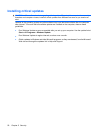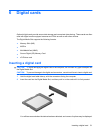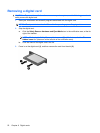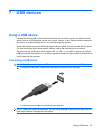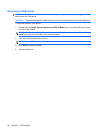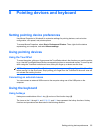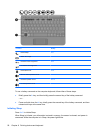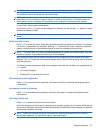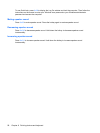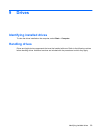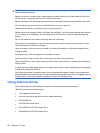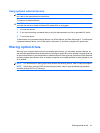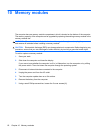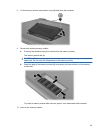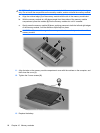
CAUTION: To reduce the risk of information loss, save your work before initiating Sleep.
The computer must be on before you can initiate Sleep.
NOTE: If a critical battery level occurs while the computer is in Sleep, the computer initiates
Hibernation and the information stored in memory is saved to the hard drive. The factory setting for
critical battery action is Hibernate, but this setting can be changed in advanced power settings.
To exit Sleep, briefly slide the power switch.
The function of the fn+f1 hotkey can be changed. For example, you can set the fn+f1 hotkey to initiate
Hibernation instead of Sleep.
NOTE: In all Windows operating system windows, references to the sleep button apply to the fn+f1
hotkey.
Switching the screen
Press fn+f2 to switch the screen image among display devices connected to the system. For example,
if a monitor is connected to the computer, pressing fn+f2 alternates the screen image from computer
display to monitor display to simultaneous display on both the computer and the monitor.
NOTE: You must use a VGA cable (purchased separately) to connect an external display, such as a
monitor or projector, to the external monitor port on the computer.
Most external monitors receive video information from the computer using the external VGA video
standard. The fn+f2 hotkey can also alternate images among other devices receiving video information
from the computer.
The following video transmission types, with examples of devices that use them, are supported by the
fn+f2 hotkey:
●
LCD (device display)
●
External VGA (most external monitors)
Decreasing screen brightness
Press fn+f3 to decrease screen brightness. Hold down the hotkey to decrease the brightness level
incrementally.
Increasing screen brightness
Press fn+f4 to increase screen brightness. Hold down the hotkey to increase the brightness level
incrementally.
Initiating QuickLock
Press fn+f6 to initiate the QuickLock security feature.
QuickLock protects your information by displaying the operating system Log On window. While the Log
On window is displayed, the computer cannot be accessed until a Windows user password or a Windows
administrator password is entered.
NOTE: Before you can use QuickLock, you must set a Windows user password or a Windows
administrator password. For instructions, refer to Help and Support.
Using the keyboard 57



